Jim Dowson: How a militant anti-abortionist took over the BNP. Part I of a three part investigation.
Through the keyhole
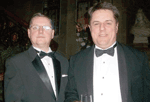
Today we start a serialisation from the current issue of Searchlight Magazine which features a special investigation into the heart of the BNP. We highlight the organisational set-up, the secret locations and the people running the fascist party. We expose how the running of the party has been outsourced to a rabid Loyalist anti-abortionist in Belfast and we reveal that this man is receiving European Union money for peace and reconciliation.
We have also been busy working with the media. Many of the revelations and exposés we have read in the newspapers over the past few weeks have originated from Searchlight.
Forty-seven years after Searchlight was first formed we are proving that we are still ahead of the game.
From rags to riches
By Gerry Gable
Ten years ago Jim Dowson (pictured) was a down-at-heel anti-abortion campaigner and hardline Protestant, who had marched with a loyalist band that played songs in praise of the convicted loyalist murderer Michael Stone (pictured below).
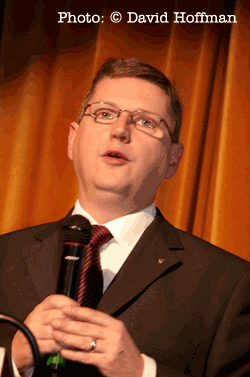
His luck changed when he formed an alliance with Justin Barrett, a far-right Catholic lawyer and leader of the notorious Irish anti-abortion group Youth Defence, which had previously stormed buildings in Dublin in their crusade against a woman’s right to choose. In 2000 Barrett had attended a rally of the German nazi National Democratic Party, where he met Roberto Fiore, the Italian fascist friend and mentor of Nick Griffin, the BNP leader. The trip was arranged by Derek Holland, one of Griffin’s old colleagues from the days of the National Front Political Soldiers.
Barrett attracted attention as the lead spokesperson of the successful Irish campaign against the Nice Treaty in 2001 and money started to flow from far-right anti-abortionists in the United States.
In 1999 Dowson had formed Precious Life Scotland and it was through cooperation between his group and Youth Defence that he met Barrett. The link proved beneficial when Barrett pitched £50,000 into Dowson’s organisation to pay for the production of anti-abortion CDs and video tapes to be distributed to schools and churches in Northern Ireland and Scotland.
Dowson was a “rent-a-cause” extremist who had been kicked out of the Orange Order. He has a list of criminal convictions including breach of the peace in 1986, possession of a weapon and breach of the peace in 1991 and criminal damage in 1992. Although a Protestant, he was happy to sell thousands of photographs of the Pope at inflated prices to Catholics in the Irish Republic.
Barrett faded from the public arena after the Nice Treaty vote was rerun and went the other way. His political demise was hastened after the publication of his book The National Way Forward, in which he described immigration as “genocidal”. He also became increasingly antisemitic, influenced by the nazi leaders he had met in Germany.
In contrast, Dowson’s campaigning activities grew. He turned his sights on gay people and encouraged his followers to abuse and threaten people who attended or worked in abortion clinics.
This resulted in Dowson parting company with some of his Precious Life fellow activists, but he was now in a financial position to go it alone, turning his faction into the UK LifeLeague. He never looked back.
Dowson, 45, started working with the British National Party late in 2007, and he quickly revolutionised its fundraising. His first appeal, launched at the time the BNP was tearing itself apart in an internal rebellion, was carried out as a free sample to show the party what he could do, but since then he has worked on a percentage commission.
His work for the BNP grew to encompass the provision of manage-ment training in Spain and revamping the party’s administration. Early in 2009 he set up the Belfast call centre, piggybacking it on his successful fundraising for the LifeLeague, thereby cutting costs and perhaps giving doubtful BNP officers the impression of a larger operation than it actually is.
Over the past two years he has clearly raised huge sums for the party, although it remains financially strapped. Partly this is the result of scams, such as the truth truck, which Griffin claimed had been bought with thousands of pounds of supporters’ donations. It turned out still to belong to Dowson’s private company, Adlorries.com, and, like much of the other equipment the BNP claimed to have bought, it was only leased by the party.
Today Dowson practically owns the BNP, which he briefly joined to placate his critics but left as soon as the heat was off him. He remains at loggerheads with many senior party officers and employees. One, whom he sacked in spring, is heading for an employment tribunal.
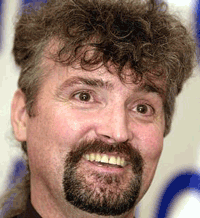
Griffin’s claim that the BNP is being flooded with donations via Dowson’s call centre is a lie. Income is down to a trickle and membership is a mere 8,000 or so. People are not queuing up to join after the end of the three-month moratorium on membership, they are leaving in droves, especially since the latest membership list leak from Dowson’s Belfast bunker.
All this comes on top of the party’s forced climbdown over its racist constitution, the non-appearance of its 2008 accounts and concern over the number of senior party officers who have been put on the European Parliament payroll as staff of the two BNP MEPs.
Hope Not Hate
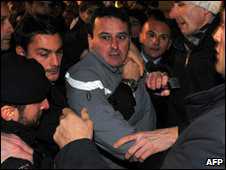






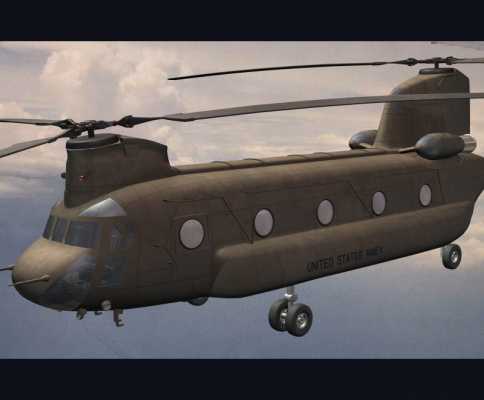

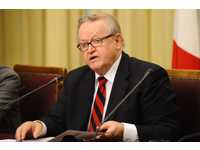 (ANSAmed) – BRUSSELS – An appeal was launched today in Brussels by the ‘wise men’ of the Independent Commission on Turkey to restart negotiations on EU membership with Ankara, which have been caught in a vicious circle for four years. The wise men – former Finnish President and Nobel prizewinner for Peace Martti Ahtisaari; fomer EU Commissioner Emma Bonino, Italy, and Hans van den Broek, Holland; former French Premier Michel Rocard; former Spanish Foreign Minister Marcelino Oreja; Austria’s former Secretary General for Foreign Affairs Albert Roahn – presented their report ‘Turkey in Europe, breaking the vicious circle’, taking the opportunity to make observations on the recent turbulent years in relations between Ankara and the EU. It all started with a ‘paradox’, said Rohan: ”Since negotiations started in 2005, the virtuous circle has turned into a vicious circle”. There are several reasons for this change of tack: the thorny issue of Cyprus, with the failed 2004 referendum over the reunification of the island following the ‘no’ vote by the Greek-Cypriots, the slowing-down of reforms by Ankara, and also ”the opposition to Turkey’s entry on the part of several European leaders and public opinion in many countries”. The positions of the leaders, said Rohan, ”are in stark contradiction to the unanimous decision to open adhesion negotiations taken by heads of State and government in December 2004. This attitude has given Turkey the impression of not being wanted, of being treated differently from other candidates. But this approach is contrary to European interests: Turkey is a strategic country for energy routes, its presence in the Caucasus, its economic strength in Central Asia, and its negotiating weight in the Middle East”. The result is that now more than half of the 35 chapters of negotiations for adhesion are blocked, either because of Cyprus’ veto, as a response to the lack of full application of the Ankara Protocol on the part of Turkey, which regulates customs relations with the 27 countries, or because of the block placed informally by other chapters. France has blocked five chapters, preferring to focus on partnership rather than integration. Austria, Germany and Holland also have political positions or public opinion overwhelmingly against Turkey’s inclusion in the EU. As for Italy, Bonino said that ”lately, for the first time, opposing positions have been taken very very firmly by the Northern League”. For this reason the former EU commissioner has called on Berlusconi to ”mediate” inside the Government so as to define a clear position ahead on the EU summit on December 9-10, during which the next steps for the adhesion talks will be defined. Emma Bonino said that the question ”of identity is an alibi for not saying anything, for not saying that they are Muslims, there are 80 million of them. I always feel like saying, what is the European identity? For me, Europe is a State of rights, division of power, democracy, open society; I do not believe that Europe is a religious project or a geographic project”. In this negative context, there are only a few signs of a change in tendency, for example the resumption of Turkish-Armenian dialogue. But the ‘wise men’ insist that ”an effort is needed, we need good news from Turkey, on its reform plans, and a greater sense of responsibility on the part of the authorities and the European media”. ‘‘Not just the credibility of Europe towards Turkey, but the international role of the EU are at stake”, concluded Ahtisaari. (ANSAmed).
(ANSAmed) – BRUSSELS – An appeal was launched today in Brussels by the ‘wise men’ of the Independent Commission on Turkey to restart negotiations on EU membership with Ankara, which have been caught in a vicious circle for four years. The wise men – former Finnish President and Nobel prizewinner for Peace Martti Ahtisaari; fomer EU Commissioner Emma Bonino, Italy, and Hans van den Broek, Holland; former French Premier Michel Rocard; former Spanish Foreign Minister Marcelino Oreja; Austria’s former Secretary General for Foreign Affairs Albert Roahn – presented their report ‘Turkey in Europe, breaking the vicious circle’, taking the opportunity to make observations on the recent turbulent years in relations between Ankara and the EU. It all started with a ‘paradox’, said Rohan: ”Since negotiations started in 2005, the virtuous circle has turned into a vicious circle”. There are several reasons for this change of tack: the thorny issue of Cyprus, with the failed 2004 referendum over the reunification of the island following the ‘no’ vote by the Greek-Cypriots, the slowing-down of reforms by Ankara, and also ”the opposition to Turkey’s entry on the part of several European leaders and public opinion in many countries”. The positions of the leaders, said Rohan, ”are in stark contradiction to the unanimous decision to open adhesion negotiations taken by heads of State and government in December 2004. This attitude has given Turkey the impression of not being wanted, of being treated differently from other candidates. But this approach is contrary to European interests: Turkey is a strategic country for energy routes, its presence in the Caucasus, its economic strength in Central Asia, and its negotiating weight in the Middle East”. The result is that now more than half of the 35 chapters of negotiations for adhesion are blocked, either because of Cyprus’ veto, as a response to the lack of full application of the Ankara Protocol on the part of Turkey, which regulates customs relations with the 27 countries, or because of the block placed informally by other chapters. France has blocked five chapters, preferring to focus on partnership rather than integration. Austria, Germany and Holland also have political positions or public opinion overwhelmingly against Turkey’s inclusion in the EU. As for Italy, Bonino said that ”lately, for the first time, opposing positions have been taken very very firmly by the Northern League”. For this reason the former EU commissioner has called on Berlusconi to ”mediate” inside the Government so as to define a clear position ahead on the EU summit on December 9-10, during which the next steps for the adhesion talks will be defined. Emma Bonino said that the question ”of identity is an alibi for not saying anything, for not saying that they are Muslims, there are 80 million of them. I always feel like saying, what is the European identity? For me, Europe is a State of rights, division of power, democracy, open society; I do not believe that Europe is a religious project or a geographic project”. In this negative context, there are only a few signs of a change in tendency, for example the resumption of Turkish-Armenian dialogue. But the ‘wise men’ insist that ”an effort is needed, we need good news from Turkey, on its reform plans, and a greater sense of responsibility on the part of the authorities and the European media”. ‘‘Not just the credibility of Europe towards Turkey, but the international role of the EU are at stake”, concluded Ahtisaari. (ANSAmed).